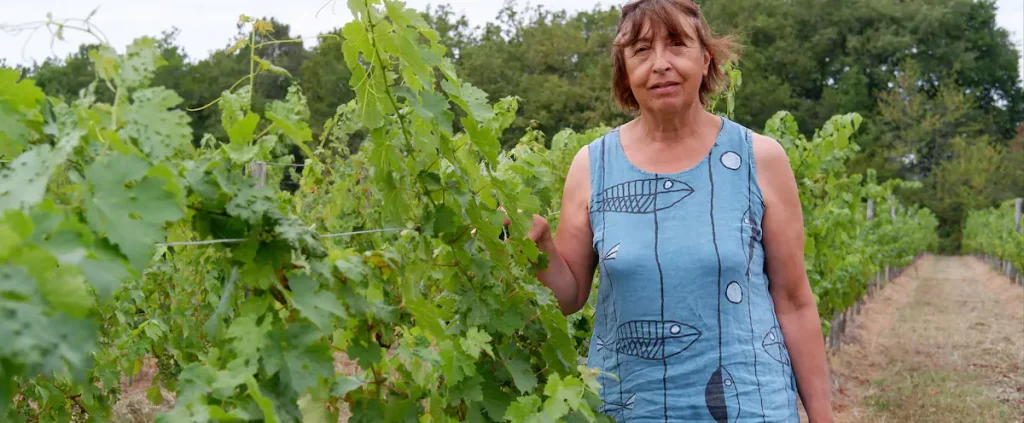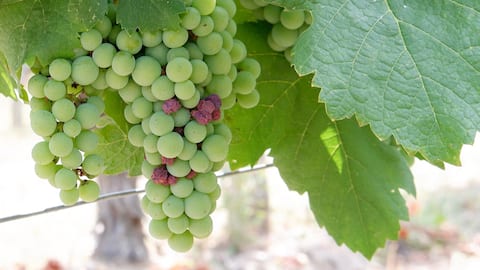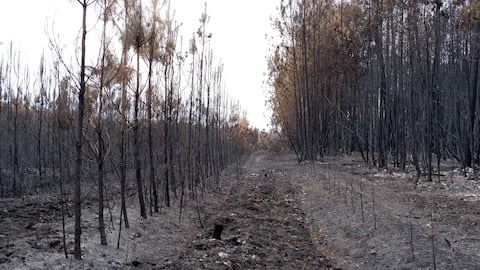
LANDIRAS, FRANCE | Many of the most popular grape varieties from the southwest of France are highly threatened by climate change, but heat waves over the past few days have dried out many of the grapes.
• Also Read: European heat wave: Evacuees fear it’s just the beginning
“We have had a severe drought for months, we have no water and we are surprised how the vines are resisting. We can see it because the young vines are suffering a lot and the heights of the vegetation are not normal”, explains Isabelle Boux, owner of the Château d’Aricaud wine estate south of Bordeaux in the Landiras.
The winemaker lamented that the heat abused her vines in her rows of vines planted in 2017.
“With the sun and the heat, these grapes are sunburnt,” she said, holding a young bunch.
rotating wind
For Joel Ortiz, wine advisor at Antennas-Associations for Agricultural and Rural Development (ADAR) in the Gironde, it is clear that the effects of global warming will have a direct impact on vineyards.
“There will be losses during harvest, that’s for sure, but it shouldn’t be too big at the moment,” he explained.
Along with the heat waves experienced in the last few days and the mercury at times exceeding 40 degrees Celsius, the mild winters also completely change the life cycle of the vine.
“Plants come out of their vegetative state earlier and when we have frost episodes in April, it can seriously damage the shoots. […] Harvest starts earlier and earlier. At present we are 15 days, three weeks earlier than fifteen years ago,” added Mr. Ortiz said.
Lose your identity
For the latter, changes in the way of work must be done.
“We are thinking of new solutions such as mulching the vines to delay soil warming in late winter or cutting the vines less so that the leaves protect the plants better during extreme heat,” he explained. – He is.
In the end, we also have to think about adapting the plants, especially, for example, by installing new grape varieties found in the southeast of the country and used to this heat, he thinks.
For Loïc Pasquet, winemaker and owner of the Liber Potter estate, some cuvés sell for 30,000 euros a bottle, Mr. The solutions mentioned by Ortiz are insufficient.
“We need to relearn how to be a winegrower by looking at what has been done before and using today’s knowledge. And we should be allowed to reintroduce old Bordeaux grape varieties and above all we are well fed,” he argued. “We must try all methods before thinking of using other grape varieties, otherwise we risk losing our Bordeaux identity,” warned Mr Pasquet.
The scars of the fire are clearly visible
After nearly twelve days of battling fires raging in south-west France, smoke can still be seen billowing in some places. News magazine.
Even yesterday, some French villages were banned in this corner of France. About 30,000 people are still unable to return home.
Police blocked the main gates.
Throughout the day, two tanker planes flew back and forth over the Landes forest, continuing to pour water on the remaining hot spots in the forest.
However, it was possible to see the damage left by the fire in Landiras by taking a small dirt road well known to local residents.
Abandoned forest
For miles, soot-blackened trunks follow one another. On the ground, the vegetation turns to ashes.
“The problem is that no one cares or manages these forests, so it’s no surprise that when the fire starts, it burns”, said Luic Pasquet, winegrower and owner of the Liber Potter estate in Landiras, in the Gironde.
By placing your hand on it, you can still feel the heat emanating from the earth.
In the air, the smell of burnt pines still lingered in some places around the village.
“I saw the fire start on July 12 and it was a few hundred meters away from my vines. The fire rose up into the trees,” explains Mr Pasvet.
Before evacuating, Mr. Paskett took care to build firewalls to protect his vines from fire. No damage was done to the vineyard side.
Climate and the humanitarian crisis in Europe
Follow our journalist Clara Loiseau as she travels through Europe over the next few days to witness the effects of unprecedented heat waves hitting the old continent as a direct consequence of global warming. Record temperatures have caused a climate and humanitarian crisis, with fires ravaging regions, citizens driven from their homes, workers dying from heatstroke on the job, and local economies severely damaged.








More Stories
Allegations of corruption Qatar warns of ‘negative impact’ of European measures
USA: Famous “Hollywood cat” euthanized in Los Angeles
The campaigner who called for the shooting of Ukrainian children has not been charged